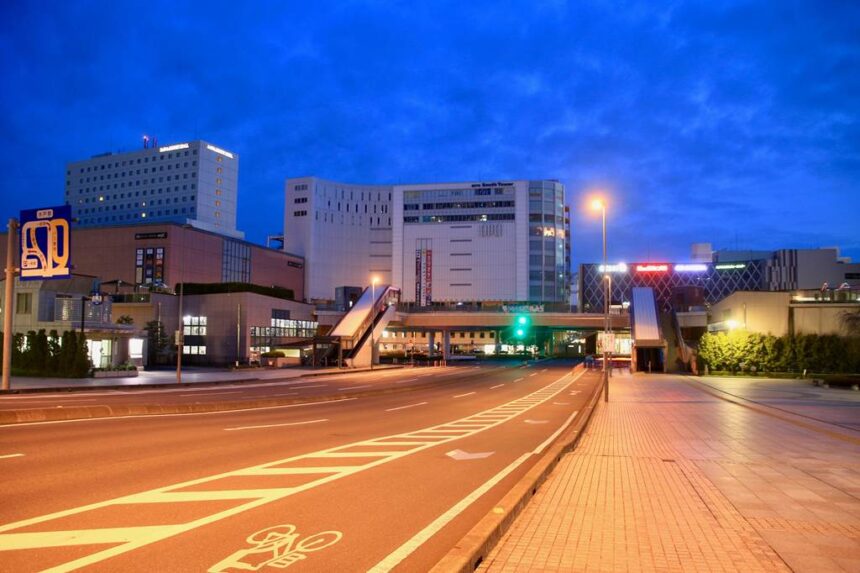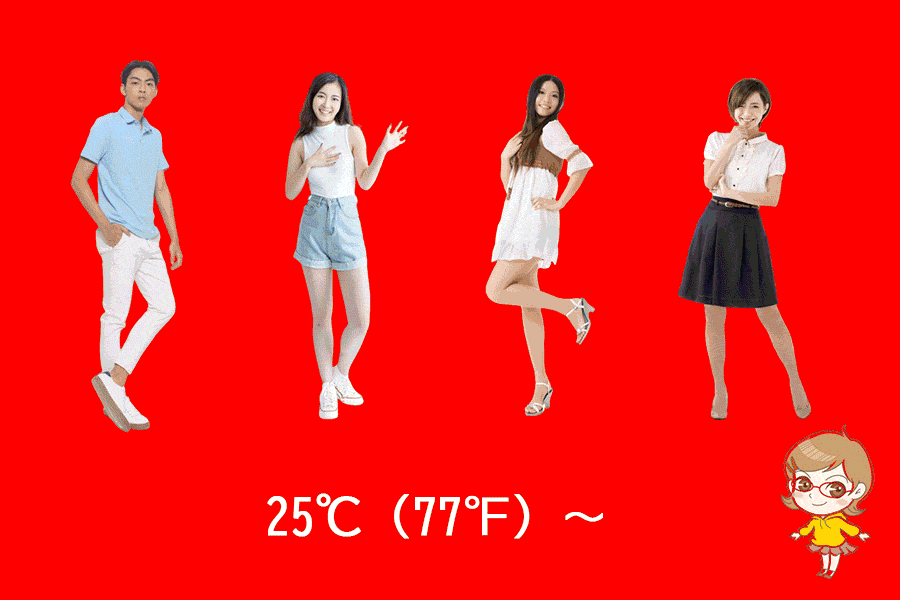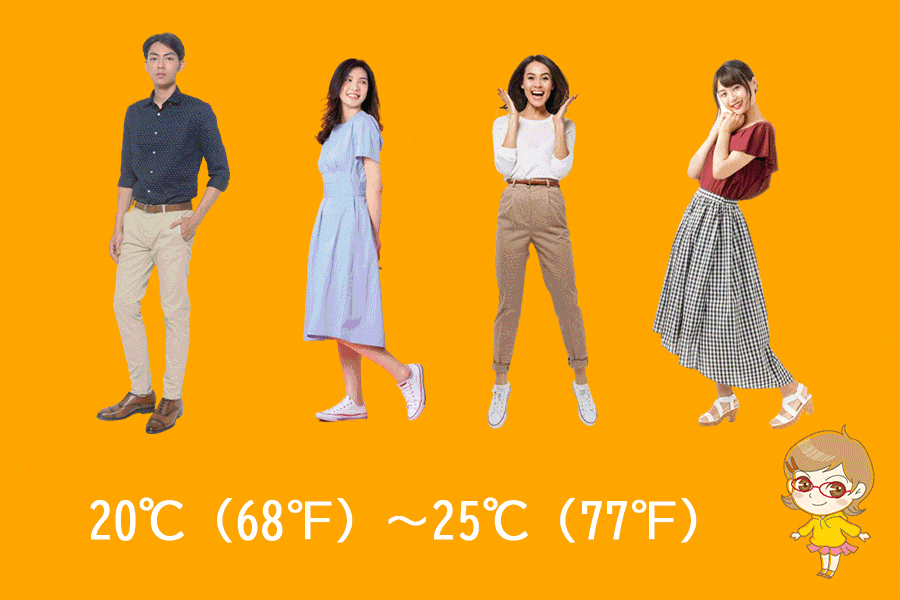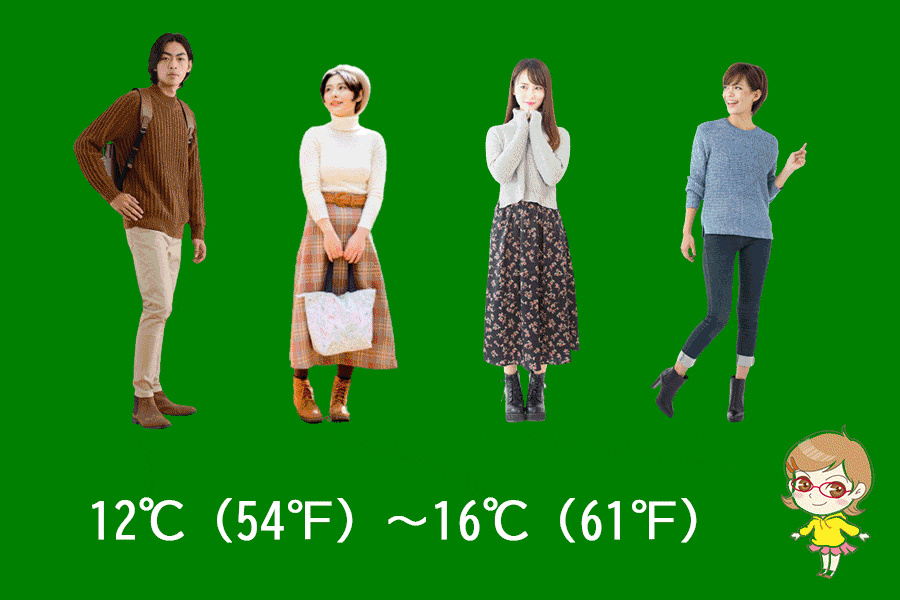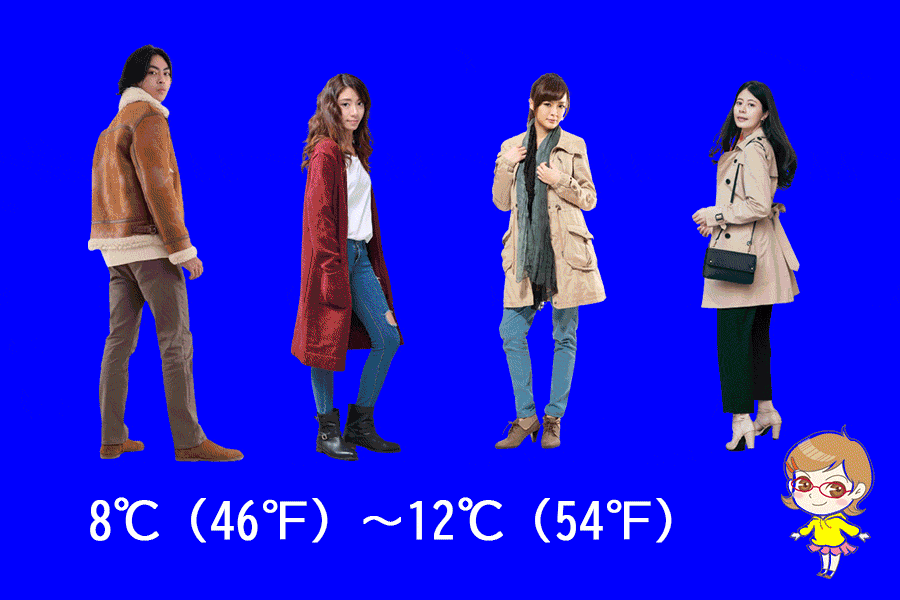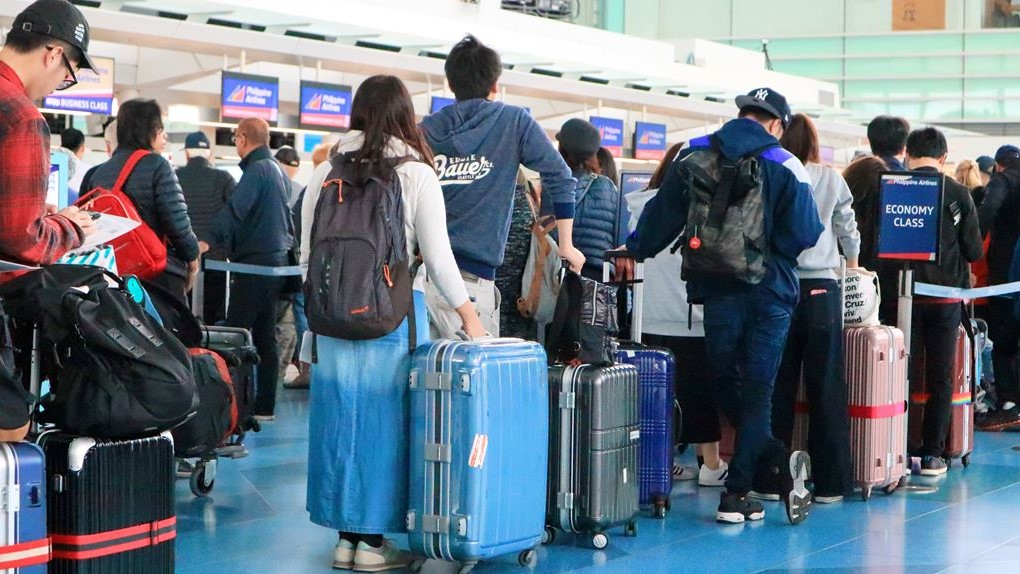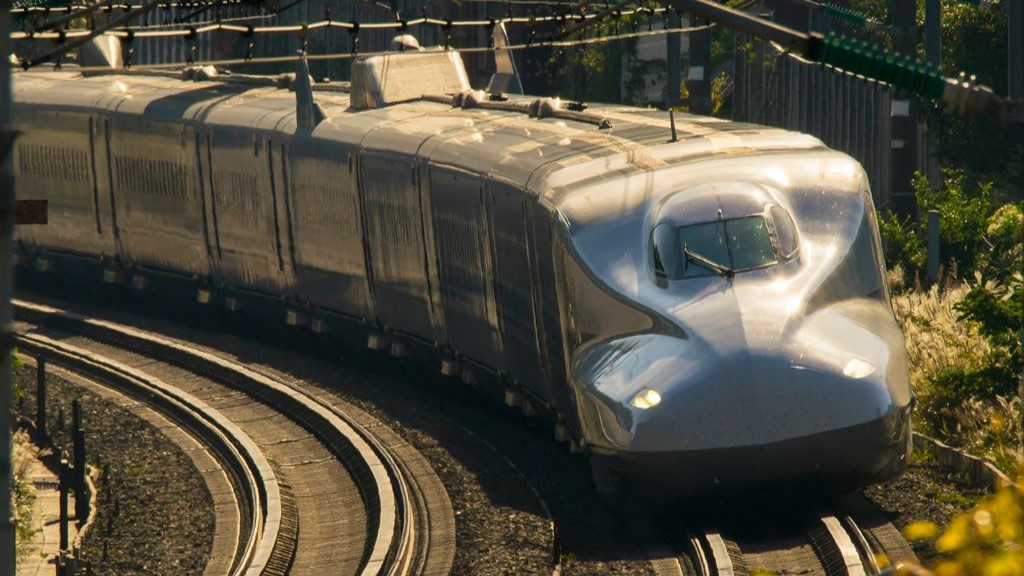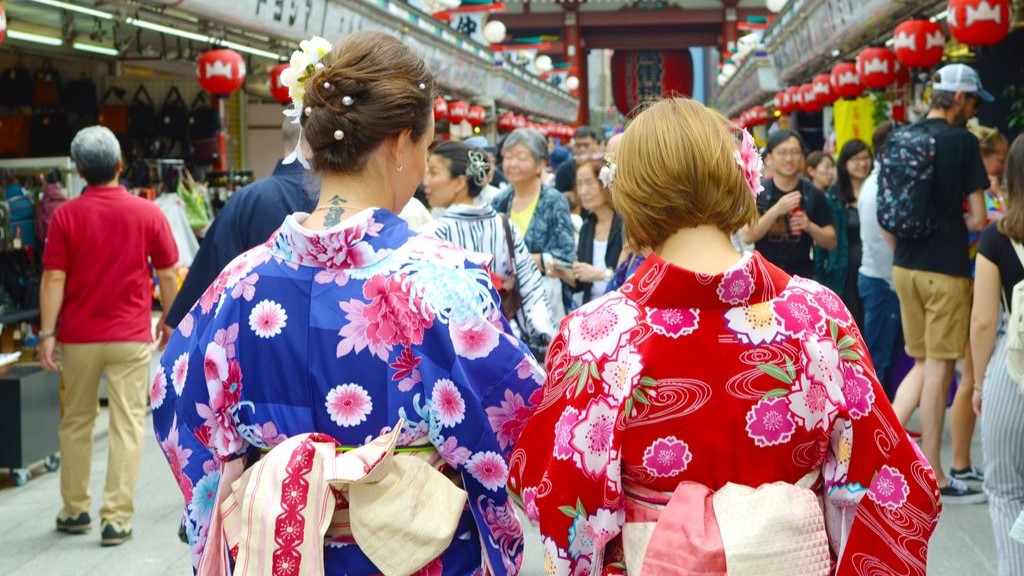1 Chome Miyamachi, Mito, Ibaraki 310-0015 MAP
↓ Click to jump to the relevant section.
| Current Weather | Annual Weather | Tourist Attractions |
| Baggage Deposit | Hotels |
Current weather and clothing
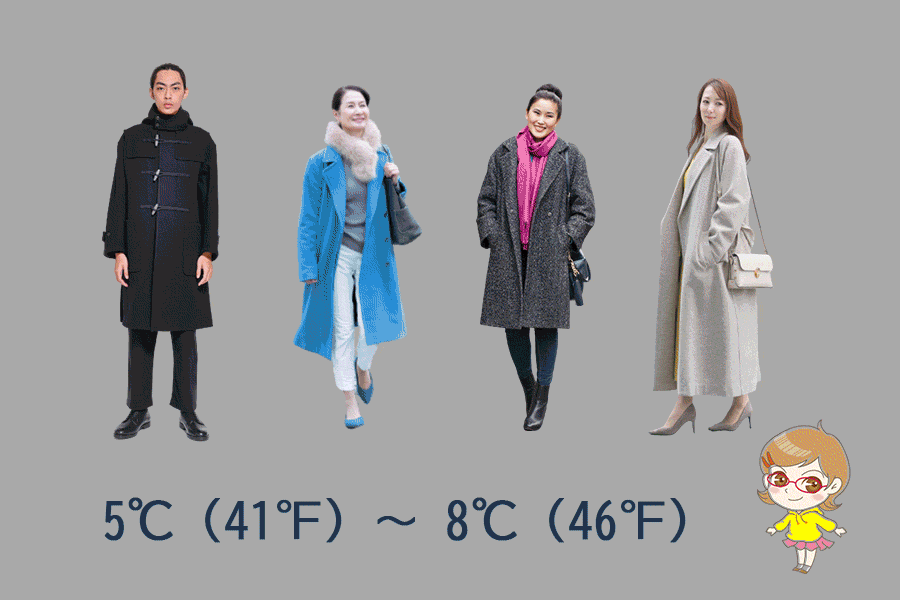
The weather information shown here is the information closest to the station in question. Please note that there may be slight differences.
Yearly temperature changes and recommended clothing
Clothing recommendations for each temperature range
When traveling in Japan with the following average temperatures, the recommended clothing is as follows:
Monthly changes in temperature, precipitation, and snowfall (1991~2020 average, Japan Meteorological Agency survey)
| Jan. | Feb. | Mar. | Apr. | May | Jun. | Jul. | Aug. | Sep. | Oct. | Nov. | Dec. | |
| temperature(°C) | 3.3 | 4.1 | 7.4 | 12.3 | 17 | 20.3 | 24.2 | 25.6 | 22.1 | 16.6 | 10.8 | 5.6 |
| precipitation(mm) | 54.5 | 53.8 | 102.8 | 116.7 | 144.5 | 135.7 | 141.8 | 116.9 | 186.3 | 185.4 | 79.7 | 49.6 |
| snowfall(cm) | 4 | 6 | 1 | — | — | — | — | — | — | — | 0 | 1 |
Winter
December
The average temperature in December is 5.6°C. The average precipitation in December is 49.6 mm. December is the beginning of the winter season, and it can get very cold in Mito. A warm coat, gloves, and a hat are recommended, as well as warm socks and shoes or boots. Women may prefer to wear pants or a skirt with tights, a sweater or jacket, and a coat, while men may prefer to wear pants, a sweater or jacket, a coat, and a scarf.
January
January is one of the coldest months of the year, with an average temperature of 3.3°C. The temperatures can drop below freezing point at night, and it can be quite chilly during the day as well. Therefore, it is advisable to wear warm clothing, such as heavy coats, jackets, sweaters, long pants, and warm boots to keep yourself comfortable. Additionally, since there can be snowfall in January, it is recommended to wear waterproof clothing, hats, gloves, and scarves to protect yourself from the cold.
February
February is slightly warmer than January, with an average temperature of 4.1°C. However, it can still be quite cold and often snowy. It is recommended to wear the same type of clothing as in January to keep yourself warm and comfortable. Waterproof clothing, hats, gloves, and scarves are also recommended.
Spring
March
March marks the transition from winter to spring, with an average temperature of 7.4°C. The weather can be quite unpredictable during this time of the year, with occasional rain, wind, or even snow. It is advisable to wear layers of clothing that you can easily remove or add as per the weather. For instance, you can wear a light jacket or coat, sweaters, long pants, and comfortable walking shoes. A raincoat or umbrella is also recommended to protect yourself from the rain.
April
April is one of the most beautiful months of the year in Mito Station, with the arrival of cherry blossoms. The average temperature in April is 12.3°C, and the weather is generally pleasant with occasional rain. It is recommended to wear light clothing, such as shirts, T-shirts, light jackets or cardigans, and comfortable walking shoes. You can also wear a hat or sunglasses to protect yourself from the sun.
May
May is one of the warmest months of the year, with an average temperature of 17°C. The weather is generally sunny and pleasant, with occasional rain. It is advisable to wear light and breathable clothing, such as shorts, skirts, T-shirts, light blouses or shirts, light jackets, and comfortable walking shoes. A sun hat or sunglasses are also recommended to protect yourself from the sun.
Summer
June
June is the beginning of the rainy season in Mito Station, with an average temperature of 20.3°C. The weather can be quite humid and rainy during this month, and it is recommended to wear lightweight, breathable clothing that dries quickly. You can wear short-sleeved shirts, shorts, skirts, light pants, and comfortable walking shoes. A raincoat or umbrella is also recommended to protect yourself from the rain.
July
July is one of the hottest and most humid months of the year, with an average temperature of 24.2°C. It is advisable to wear light, breathable clothing, such as short-sleeved shirts, tank tops, shorts, skirts, and light pants to stay comfortable in the heat. You can also wear a sun hat or sunglasses to protect yourself from the sun.
August
August is also hot and humid, with an average temperature of 25.6°C. It is recommended to wear the same type of clothing as in July to stay comfortable in the heat. You can also carry a water bottle and drink plenty of fluids to stay hydrated.
Autumn
September
The average temperature in September is 22.1°C. The average precipitation in September is 186.3 mm. The weather in September is still warm but not as hot as August. A light jacket or sweater is recommended for cooler mornings and evenings, and it can be taken off during the daytime when it gets warmer. Women may prefer to wear shorts or pants and a blouse, while men may prefer to wear pants and a polo shirt.
October
The average temperature in October is 16.6°C. The average precipitation in October is 185.4 mm. The weather in October starts to get cooler, and a jacket or sweater is recommended for both men and women. Women may prefer to wear pants or skirts and a blouse, while men may prefer to wear pants and a long-sleeved shirt.
November
The average temperature in November is 10.8°C. The average precipitation in November is 79.7 mm. November is a cool month, and warm clothing is recommended, such as a coat or a heavier sweater. Women may prefer to wear pants or a skirt with tights and a sweater or jacket, while men may prefer to wear pants, a sweater or jacket, and a scarf.
Recommended tourist destinations
Kairakuen Park
1-3-3 Tokiwacho, Mito 310-0033 Ibaraki Prefecture
This Japanese garden was built in 1842 and is renowned as one of the three best gardens in Japan. It is famous as one of the three most famous gardens in Japan, and has an ume (plum) grove of about 3,000 trees, and an annual ume (plum) festival is held from mid-February to the end of March.
Kobuntei
1-3-3 Tokiwacho, Mito 310-0033 Ibaraki Prefecture
A simple and elegant Japanese-style villa with the elegance of a samurai, built within Kairakuen Garden. The view of the garden and the historic buildings will give you a sense of the Japanese atmosphere.
Semba Boadwalk
3080 Senbacho, Mito 310-0851 Ibaraki Prefecture] The lake is located southeast of Kairakuen and has a circumference of 3 km. A promenade lined with cherry blossom trees surrounds the lake, making walking and jogging enjoyable. Visitors can enjoy Japanese sweets and powdered green tea at teahouses by the lake.
Kodokan Park
1-6-29 Sannomaru, Mito 310-0011 Ibaraki Prefecture
The school was built in 1841 for samurai and their children to study. The atmosphere of those days has been preserved. The 15th Tokugawa Shogun, Yoshinobu Tokugawa, studied here as a child.
Hitachi Seaside Park
605-4 Mawatari Onuma, Hitachinaka 312-0012 Ibaraki Prefecture
The park consists of seven different areas where visitors can enjoy seasonal flowers and attractions such as an amusement park. The Miharashi area overlooking the ocean is a popular photo spot. In spring, nemophila flowers bloom all at once, creating a blue carpet that covers the entire hillside, a scene that is famous throughout Japan.
Nakaminato Fish Market
19-8 Minatohoncho, Hitachinaka 311-1221 Ibaraki Prefecture
Freshly caught seasonal local fish and processed seafood can be purchased at reasonable prices. The site is also lined with restaurants and sushi bars where you can enjoy fresh seafood dishes.
Oarai Isosaki Shrine
6890 Isohama-cho, Oarai-machi, Higashiibaraki-gun 311-1301 Ibaraki Prefecture
A shrine with a long history, built in 856. The torii gate stands on a rock in the sea, creating a mysterious scene. Many photographers gather here at sunrise throughout the year.
Aqua World Ibaraki Prefectural Oarai Aquarium
8252-3 Isohamacho, Oarai-machi, Higashiibaraki-gun 311-1301 Ibaraki Prefecture
The aquarium breeds more than 60,000 marine creatures from around the world. The number of sharks, the symbol of the aquarium, is the largest in Japan. The sunfish swimming in one of Japan’s largest dedicated aquariums is also a popular attraction.
Kasama Kogei no Oka
2388-1 Kasama, Kasama 309-1611 Ibaraki Prefecture
A complex facility located in the Kasama Art Forest Park. Visitors can try their hand at making plates and tableware, and there is also a store selling Kasama-yaki (ceramic art) and a café where visitors can enjoy sweets made from locally produced ingredients.
Where to leave your luggage
When you exit the ticket gate and go to the left, you will see coin lockers on your right. 100 or so are available, so you can easily find them. The hours of use are from the first train to the last train.
Recommended hotels and inns
Hotel Terrace The Garden Mito
1-7 Miyamachi, Mito 310-0015 Ibaraki Prefecture
3-minutes walk from Mito Station
Hotel class: 4
Hotel style: City View , Mid-range
Check Rates & Availability:
>> See on Tripadvisor
>> See on Trip.com
Hotel The Westhills Mito
1-2-1 Daikumachi, Mito 310-0031 Ibaraki Prefecture
1.1 mi/1.8 km from Mito Station
Hotel class: 4
Hotel style: Charming , Business
Check Rates & Availability:
>> See on Trip.com
Mito Plaza Hotel
2078-1 Senbacho, Mito 310-0851 Ibaraki Prefecture
2.5 mi/4.0 km from Mito Station
Hotel class: 5
Hotel style: Luxury , Charming
Check Rates & Availability:
>> See on Tripadvisor
>> See on Trip.com
>> See on Expedia
Mito Keisei Hotel
1-4-73 Sannomaru, Mito 310-0011 Ibaraki Prefecture
4-minutes walk from Mito Station
Hotel class: 4
Hotel style: Family , Centrally Located
Check Rates & Availability:
>> See on Tripadvisor
>> See on Trip.com
>> See on Expedia
JR-East Hotel Mets Mito
1-1-1 Miyamachi, Mito 310-0015 Ibaraki Prefecture
2-minutes walk from Mito Station
Hotel class: 3
Hotel style: Centrally Located , Charming
Check Rates & Availability:
>> See on Tripadvisor
>> See on Trip.com
>> See on Expedia
Daiwa Roynet Hotel Mito
1-7-44 Miyamachi, Mito 310-0015 Ibaraki Prefecture
3-minutes walk from Mito Station
Hotel class: 3
Hotel style:Mid-range , Centrally Located
Check Rates & Availability:
>> See on Tripadvisor
>> See on Trip.com
>> See on Expedia
Court Hotel Mito
2-8-22 Jonan, Mito 310-0803 Ibaraki Prefecture
7-minutes walk from Mito Station
Hotel class: 3
Hotel style:Budget , Centrally Located
Check Rates & Availability:
>> See on Tripadvisor
>> See on Trip.com
>> See on Expedia
President Hotel Mito
2-2-2 Jonan, Mito 310-0803 Ibaraki Prefecture
6-minutes walk from Mito Station
Hotel class: 3
Hotel style:Business
Check Rates & Availability:
>> See on Tripadvisor
>> See on Trip.com
>> See on Expedia
Hotel Lake View Mito
1-6-1 Miyamachi, Mito 310-0015 Ibaraki Prefecture
3-minutes walk from Mito Station
Hotel class: (new)
Hotel style:Business , Budget
Check Rates & Availability:
>> See on Tripadvisor
>> See on Trip.com
We support your itinerary planning!
Click the button to get an overview of hotel information and popular tourist routes from all over Japan featured on our site. We’ve included comprehensive details to aid in planning your trip, so please make use of it.
Comprehensive checklist before traveling to Japan

Book flights
Compare and purchase flight tickets
When planning your trip to Japan, it's advisable to start by researching flights several months in advance. Airlines often release promotional fares, especially during off-peak seasons. Use comparison sites like Skyscanner or KAYAK to get a sense of the price range. Be flexible with your travel dates if possible; flying mid-week might be cheaper than on weekends.
>> Visit Skyscanner's official website
>> Visit KAYAK's official website
Order Japan Rail Passes for each family member
Purchase your Japan Rail Pass before departure
The Japan Rail (JR) Pass offers unlimited travel on JR trains, making it a cost-effective option for tourists. However, it's only available to foreign tourists and must be purchased *before* you arrive in Japan. Determine the areas you plan to visit; if you're traveling extensively, a nationwide pass is beneficial, but if you're only exploring a specific region, consider regional JR passes. Children under 12 get a discounted pass, so ensure you order the correct type for each family member.
>>Visit Japan Rail Pass's website
Plan your attire for Japan
Check the weather at your destination on this site
Japanese weather varies significantly by season. In summer, it's hot and humid, so breathable clothes are essential. Winters, especially in the north, can be cold, requiring warm attire. If visiting during the rainy season (June to early July), pack a good umbrella and waterproof shoes. While Japan is generally casual, certain places like temples, shrines, or upscale restaurants may require modest and neat dressing.
Reserve a pocket Wi-Fi or SIM card
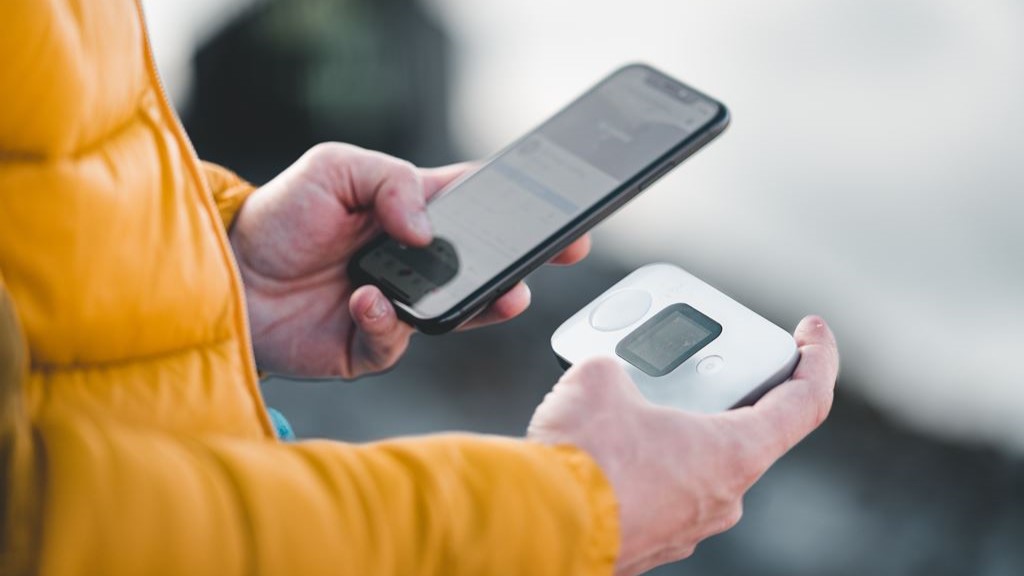
SIM card or pocket Wi-Fi is required
Beyond clothes, consider packing essentials like a universal power adapter (Japan uses Type A and B sockets), portable Wi-Fi or SIM card for internet access, and any necessary medications (with a copy of the prescription).
Which is better: a SIM card or pocket Wi-Fi?
When traveling in Japan, one essential to consider is securing internet access, especially given that many locations still don't offer free Wi-Fi. To ensure you can use your smartphone throughout your trip, you'll typically have three options: (1) a SIM card, (2) pocket Wi-Fi, or (3) the roaming service provided by your mobile company. Roaming services can be quite expensive, so we often recommend using a SIM card or pocket Wi-Fi. While SIM cards tend to be more affordable than pocket Wi-Fi, they can be trickier to set up. Pocket Wi-Fi, on the other hand, can be shared among several users, making it a favorable choice for families or groups.
▼SIM card
Advantages:
Relatively affordable.
Disadvantages:
Can be time-consuming to set up initially.
May have strict data limits.
▼Pocket Wi-Fi
Advantages:
Offers substantial data allowances.
A single device can be shared among multiple users.
Easily usable with PCs as well.
Disadvantages:
Typically more expensive.
Japan's representative services
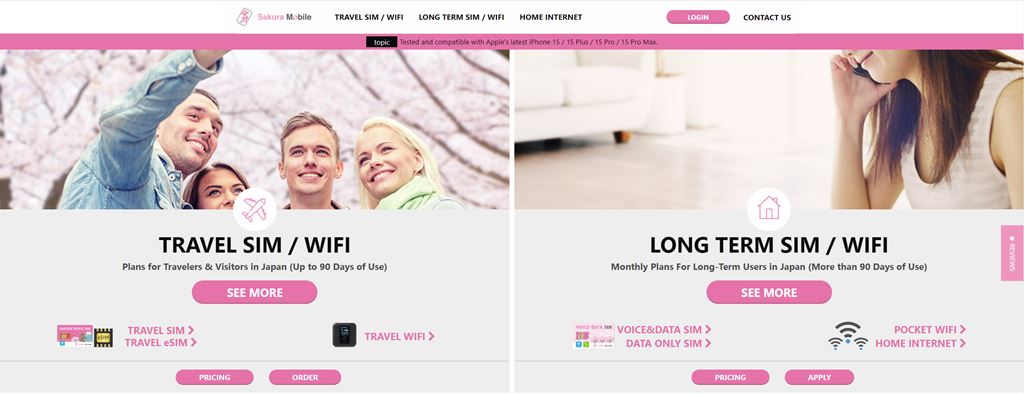
Sakura Mobile's website
▼SIM card
>>Visit Sakura Mobile's official website
>>Visit mobal's official website
▼pocket Wi-Fi
>>Visit Sakura Mobile's official website
>>Visit NINJA WiFi's official website
>>Visit Wi-Fi RENTAL Store's official website
Book local tours as needed
Pre-book your tour and have a great trip!
Local tours offer deep insights into Japan's culture and heritage. Websites like Viator or GetYourGuide offer a variety of tours, from traditional tea ceremonies to modern pop culture tours in Akihabara. Consider unique experiences like staying with monks on Mt. Koya or taking a cooking class to learn authentic Japanese dishes.
>>Visit Viator's official website
>>Visit GetYourGuide's official website
Purchase advance tickets for popular attractions
Make a reservation to avoid crowds
Attractions like Tokyo Disneyland, Universal Studios Japan, or the Studio Ghibli Museum often have long ticket queues. Buy tickets online in advance to save time. Some attractions also have timed entry, so check the specific time slots available and plan accordingly.
▼Tokyo Disney Resort
>>Visit Tokyo Disney Resort official website
>>Visit Viator's Tokyo Disneyland page
>>Visit Viator's Tokyo DisneySea page
>>Visit GetYourGuide's Tokyo Disneyland page
>>Visit GetYourGuide's Tokyo DisneySea page
▼Universal Studios Japan
>>Visit USJ official website
>>Visit Viator's USJ page
>>Visit GetYourGuide's USJ page
Buy travel insurance

insurance concept, health, life and travel insurance
It is important to be prepared for emergencies
While Japan is a safe country, travel insurance is crucial for unforeseen events like health emergencies, travel disruptions, or lost baggage. Ensure your policy covers medical expenses in Japan, as healthcare, though excellent, can be expensive.
Here we introduce online travel insurance services that are popular worldwide.
World Nomads: An online travel insurance service widely endorsed by travelers worldwide. They offer plans that cover adventurous activities and high-risk sports.
>>Visit World Nomads' official website
AIG Travel Guard: An insurance service available to travelers all over the world. They offer a wide range of options, including cancellation protection and emergency medical insurance.
>>Visit AIG Travel Guard's official website
Share your itinerary with emergency contacts
Organize your reservation information
Keep a digital and printed copy of your detailed itinerary, including hotel addresses, train schedules, and booked tours. Share this with a trusted family member or friend not traveling with you.

